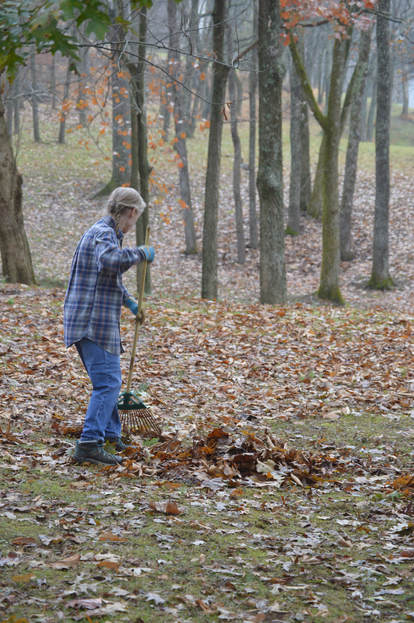 Photo by Rick Showalter. Photo by Rick Showalter. My husband and I spent Thanksgiving Day raking. An acre of property, 40 mature deciduous trees. We barely made a dent. Nonetheless, it was a rare sunny, cool day and a pleasant way to avoid any potential holiday stress. The irony of our labor didn’t strike me until a friend called me out. “So, you’ve been out raking the forest floor, huh?” he chided. “Doing your part to prevent local forest fires?” Most of us have enjoyed the sardonic memes posted by the Finns after President Trump’s public statements about how the good citizens of Paradise, Calif. (not “Pleasure,” dear President) could have avoided near annihilation if they had properly raked and cleaned the floors of the nearby forests, like the Finns. (Never mind that the Finnish President has denied ever mentioning “raking” when talking with President Trump. Or the fact that the Finns have complex structural and systemic ways of preventing forest fires in their country.) Twitter exploded with photos of Finns smiling with their rakes and references to #RakeAmericaGreatAgain and #Rakenews. In the Washington Post, columnist Philip Bump kept a straight face as he calculated how many man hours it would take to sweep and cart away all of the debris on America’s forest floors. And how much of our budget would be required for the purchase of equipment for that purpose. (No mention was made of the devastation that would rain upon forest critters large and small who depend on that debris for cover or sustenance.) All humor aside, the rampaging wildfires are real. The loss of life is real. Those who survived have found their lives totally upended, with no home, no supplies, no job to return to, no idea of what their future holds. The president is right that we must find a way to prevent this sort of devastation. We must work together to protect land and property and lives. But we cannot do that successfully until we admit that climate change is worsening the natural disasters afflicting us around the world. As the Camp Fire in northern California raged, Cal Fire spokesman Bryce Bennett told the Sacramento Bee, "Right now, Mother Nature is in charge." That will never change. But there are things we can do to mitigate the conditions that fuel droughts and wildfires in the western part of our country, floods in the east, and hurricanes along the coasts. Unfortunately, we as a nation have no appetite for addressing what is at the crux of the problem: greed and a craving for comfort. We seem unwilling to make sacrifices to protect our forests, our shorelines, our food sources, our water supply, the purity of our air, or the diversity of our ecosystems—despite the avalanche of data about what our future holds. For some reason, other countries see the writing on the wall and have joined together to protect their citizens’ interests, while here in the U.S. we strip environmental regulations, over-develop threatened areas, and decry a “War on Coal.” A persistent chorus of experts, thankfully, continue to sound the alarm. Another month, another comprehensive report about imminent catastrophes from climate change. Last month scientists representing the U.N.’s Intergovernmental Panel on Climate Change warned of the dire consequences we can expect by 2040 if we don’t take steps now to slow the warming of the planet. This month—the day after Thanksgiving, alas—13 federal agencies in President Trump’s executive branch predicted economic devastation by the end of the century if we don’t heed the warning signs. According to the New York Times, “All told…climate change could slash up to a tenth of gross domestic product by 2100, more than double the losses of the Great Recession a decade ago.” The projected price tag for our inertia? “$141 billion from heat-related deaths, $118 billion from sea level rise and $32 billion from infrastructure damage by the end of the century.” International trade will be disrupted. Agriculture will suffer. Diseases will spread. The numbers of people dying in heat waves and storms will dramatically increase. You would think that would get President Trump’s attention. He likes to think of the value of things in dollars and cents. Perhaps someone will finally convince him to listen to his administration’s experts at NASA, NOAA, the EPA, and other agencies. But don’t hold your breath. We’re not talking about the future any more. We’re talking about now. We’re talking about the devastation that is occurring in our own country right now. And we’re still sticking our heads in the sand. Here in central Kentucky, we’ve had 20 more inches of rain than we typically have by this time of year. We’re mired in mud and mildew. The grass is still growing. I have a lot of raking yet to do. Our lives may have been inconvenienced. But we still have our home. Our health. We’re comfortable, you know. But for how long? What will it take for us to act?
0 Comments
Your comment will be posted after it is approved.
Leave a Reply. |
Details
Archives
June 2023
Categories
All
|


 RSS Feed
RSS Feed